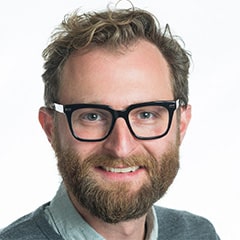MSE Seminar Series

Friday, April 23, 2021 @11:40am
*Remote course - Zoom link will be provided
Daniel Simon, PhD,
Associate Professor, Linköping University, Norrköping, Sweden
presents
Recent Advances in Iontronics
ABSTRACT:In contrast to electronic systems, biology rarely uses electrons as the signal to regulate functions, but rather ions and molecules of varying size. Due to the unique combination of both electronic and ionic/molecular conductivity in conjugated polymers and polyelectrolytes, thesematerials have emerged as an excellent tool for translating signals between these two realms, hence the field of organic bioelectronics. Since organic bioelectronics relies on the electron-mediated transport and compensation of ions (or the ion-mediated transport and compensation of electrons), a great deal of effort has been devoted to the development of so-called iontronic components to effect precise substance delivery/transport; that is, components where ions are the dominant charge carrier and where ionic-electronic coupling defines device functionality. This effort has resulted in a range of technologies including ionic resistors, diodes, transistors, and basic logic circuits for the precisely controlled transport and delivery of biologically-active chemicals. In this presentation, I will give an overview of such “ion pumping” technologies, how they have evolved over the last decade, and what we’ve learned along the way. The presentation will particularly focus on recent advances in understanding – and optimizing – iontronic transport, as well as the latest advances in miniaturization and biology/therapy-relevant device geometries. The discussion will include applications in vitro, in vivo, and in plantae, and where we see this excitingtechnology going in the near future.
BIOGRAPHY:

Daniel Simon received his Bachelor's degree in Physics from the University of Georgia, Athens (USA) in 2000, where he participated in theoretical condensed matter research under Michael Geller. In 2001, he began his graduate work in the Physics department at the University of California, Santa Cruz (USA). There, he joined the laboratory of Sue Carter, studying a range of topics in polymer-based electronics. In 2004, Daniel received his Master's degree, based on electronically patterned polymer films on micro-electrode arrays. In the Spring of 2007, he earned his PhD, based on polymer light-emitting electrochemical cells (LECs) and nanoparticle-based non-volatile memory (in collaboration with Campbell Scott and Luisa Bozano at IBM Almaden). Later that year, he joined the Laboratory of Organic Electronics at Linköping University, Sweden, as a postdoctoral researcher with Magnus Berggren, where he focused on converting in vitro delivery technology for use in living animals. During 2009-2011, he held a 50% postdoc position at the Neuroscience Department at the Karolinska Institute in Stockholm, where he further adapted his organic bioelectronics tools for artificial neuron functionality in vitro. Since 2011, Daniel has led – and significantly expanded – the Organic Bioelectronics group of the Laboratory of Organic Electronics. In 2013, he became Assistant Professor, and in 2016, Associate Professor.
Laboratory of Organic Electronics at Linköping University – https://liu.se/loe
Organic Bioelectronics group page – https://liu.se/en/research/
Personal university page – https://liu.se/en/employee/